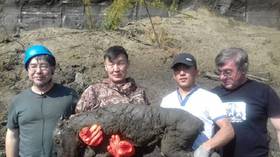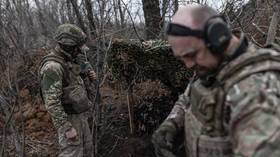Scientists attempt to clone extinct horse after LIQUID BLOOD found in 42,000 yo remains

A team of scientists in Russia has blood on its hands: namely, the vital fluid preserved inside the remains of an ancient horse that died 42,000 years ago, which could provide the key needed to clone the species back to life.
“Samples of liquid blood were taken from heart vessels – it was preserved in the liquid state for 42,000 years thanks to favorable burial conditions and permafrost,” said Dr. Semyon Grigoryev, head of the Mammoth Museum in Yakutsk.
“We can now claim that this is the best preserved Ice Age animal ever found in the world,” he added.
“Blood” sample taken from 42,000-year-old #IceAge foal. What happens next? https://t.co/TmgQWrTYwY Photos: North-Eastern Federal University pic.twitter.com/YLBrL66XaI
— The Ice Age (@Jamie_Woodward_) April 16, 2019
In addition to the blood, the remains contained “beautifully preserved internal organs,” Grigoryev said, adding that the autopsy of the remains reveal that the Ice Age horse, belonging to the “Lenskaya” species, died of drowning at just two weeks old.
“A lot of mud and silt which the foal gulped during the last seconds of its life were found inside its gastrointestinal tract,” Grigoryev said.
Also on rt.com Winter is Coming: WATCH snow tsunami devour Siberian cityThe discovery may help scientists revive the Ice Age horse species through cloning, and some researchers already say they are “confident of success” in that endeavor, adding that the cloning attempts have already begun and will continue until the end of April.
Plans were unveiled last year to build a cloning center for the North-Eastern Federal University (NEFU) in Yakutsk, at the cost of $5.9 billion. The center, according to NEFU rector Evgenia Mikhailova, would include a “world class” paleo-genetic lab, which would study extinct animals using living cells, ultimately with a goal of bringing them back to life.
While the foal’s remains were unearthed last year, the discovery of liquid blood is a new find.
The finding comes as a result of two months of intense collaboration between scientists at NEFU in Yakutsk and the South Korean Sooam Biotech Research Foundation.
Think your friends would be interested? Share this story!














